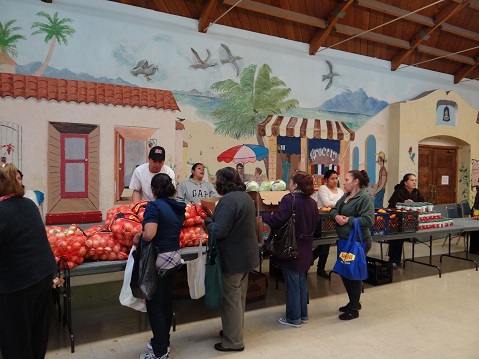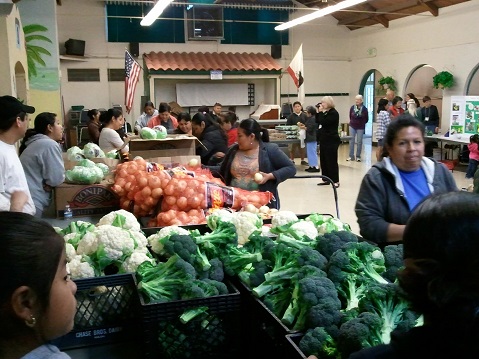Sharing Goleta’s Backyard Bounty
Fruit Trees and Vines Picked for Free

If you are one of the many Goleta Valley backyard food growers and have a few trees groaning under the weight of fruits you cannot eat or give to the neighbors, help is only a call away. Even better, relieving your vines or fruit trees will assist in feeding needy residents in your community.
After a short hiatus, the Santa Barbara County Foodbank has a new coordinator for its Backyard Bounty food-harvesting program. Niles Brinton, a recent graduate of UC Santa Barbara’s Bren School of Environmental Science and Management, has been on the job only a few weeks and already has Goleta soil under his fingernails.

“One day I helped an elderly lady who lived off North Patterson Avenue harvest around 275 pounds of grapefruit from her trees,” he told me late last month. “We could’ve gotten more, but we ran out of boxes and daylight.” That same day he picked up a 1,600-pound donation of avocados from a couple in Carpinteria.
These were emergencies. Picking and packing fruit is not Brinton’s main job. As his title suggests, he is Foodbank’s liaison between small growers and the nonprofit’s two warehouses in the Goleta Valley and Santa Maria. Large farmers and grocery chains donate produce and other foodstuffs through different channels.
The coordinator works with Foodbank staff to organize volunteers for gathering and transporting the produce if the donor cannot do it himself. Timing is often crucial since ripening fruit or vegetables have to be matched with volunteers’ availability and Foodbank’s small fleet of trucks. Volunteer labor helps to schedule, pick, pack, and transport the surplus to the warehouses. Distribution currently is through a network of 330 nonprofit agencies and programs, which are integral partners with the countywide organization.
Two of the many Goleta Valley beneficiaries are Friendship Manor (which provides room and board for retirees) and Isla Vista Youth Projects (low-income children’s preschool and after-school programs). In 2013, they received a combined total of more than 114,000 pounds of food, with a calculated value of nearly $200,000. Backyard Bounty provided a portion of that total.
Jamie Nichols, Foodbank’s director of operations and Brinton’s supervisor, does not have precise figures for Bounty donations from Goleta, but he labels them “significant.” He estimated that, considering seasonal variability, “local” sources provided around half of the produce and 20-40 percent of the bank’s total 16,700 pounds currently warehoused in the Page Center on Hollister. To him, local means from within the county.

Brinton, a native of South Carolina, said that the Backyard Bounty’s purpose is to channel healthy, surplus produce from private properties to the plates of the hungry through the nonprofits. Though he has no way of knowing if this food is organically grown, he figures it is probably pesticide free. There is “a good chance,” he said, the produce from “private donors has had less exposure to pesticides” than that from large, commercial farms. Donations from small organic farms, like Fairview Gardens and Ellwood Canyon Farms, are considered safe from pesticides, as well.
This system depends heavily on timely information and volunteer labor as well as the generosity of the home gardener. Brinton said that while he will send out pickers if the potential harvest is from three to five fruit trees, it is more efficient to have several backyards to pluck on the same trip. He hopes to develop a system of “neighborhood harvesters” with a designated “point person” to alert residents to Foodbank’s services and avoid wasting food.
Should you be interested in volunteering labor or offering your fruits and veggies to others, Brinton can be called at (805) 403-8327. He prefers calls between 9 a.m. and 5 p.m. but is known to respond to voicemail outside those hours. In any case, he has set an ambitious course for the Backyard Bounty Program and welcomes inquiries.
Once a system of neighborhood harvesters is in place, he said he expects to have a supply network of donors stretching from West Goleta to Carpinteria. The goal, he added, is to provide “tens of thousands of pounds of fruit each month” to the Foodbank’s South County warehouse. Presently, Brinton is creating a donor database to move toward these objectives — with time out for emergency harvests.



